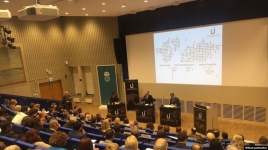Armenian FM Deplores ‘Maximalism’ In Karabakh Peace Process
Wednesday, November 6, 2019
Maximalist approaches will not lead to peace in Nagorno-Karabakh, Armenian Foreign Minister Zohrab Mnatsakanian said in his answer to a question from an Azerbaijani lawmaker at an international event in Stockholm, Sweden.
On November 5, the top Armenian diplomat attended a ministerial meeting of six former Soviet nations participating in the European Union’s Eastern Partnership Program, including Azerbaijan, that marked its 10th anniversary.
On Wednesday Mnatsakanian delivered a lecture on Eastern Partnership at the Swedish Institute of International Relations during which he also took questions from the audience.
In his question member of the Azerbaijan Parliament, Asim Mollazade alleged a string of atrocities committed by Armenians in Nagorno-Karabakh before asking the Armenian minister whether Yerevan was ready for international arbitration with Baku over “military and other crimes.”
Replying to this question, Mnatsakanian said: “And have you ever heard of [pogroms of Armenians] in Baku, Sumgait, Maragha, the occupation of the Shaumian district? Have you heard of the occupation of part of the Martakert district, part of the Martuni district [of Nagorno-Karabakh]?... Are you ready to understand our concern? Are you ready to engage in a dialogue? Or is there only your truth and there is no other? Is it that the solution should be the one you want or else there will be no solution? A maximalist approach will never lead us to peace. This is what underlies my thesis about the need to prepare the peoples for peace.”
Mnatsakanian also spoke about the threat to ethnic Armenians in Nagorno-Karabakh, stressing that the form of organization in the disputed region today is the only way to preclude aggression and occupation on the part of Azerbaijan.
“[It precludes] aggression, occupation, and a threat to the physical and existential security of our 150,000 compatriots. These are people who have names, families, homes, their own concerns about physical security, and there is no way of ensuring their security other than what we have today. The negotiations are conducted precisely around how to reach a point that will not address the maximalist demands of one side at the expense of others,” the Armenian minister underscored.
Nagorno-Karabakh, an autonomous district in Soviet Azerbaijan, broke free from Baku’s control amid Soviet Union disintegration in the early 1990s, triggering a three-year war that killed an estimated 30,000 people and left ethnic Armenians in control of the region.
A Russian-brokered ceasefire put an end to large-scale fighting in 1994, but sporadic skirmishes along the line of contact have continued to claim human lives on both sides since then.
The single largest and deadliest escalation in the conflict zone occurred in April 2016 when scores of soldiers on both sides were killed in what was later dubbed as a four-day war. Armenians and Azerbaijanis blamed each other for the escalation.
International diplomatic efforts to resolve the conflict led by Russia, the United States and France as part of the Organization for Security and Cooperation in Europe have brought little progress during the past 25 years.
https://www.azatutyun.am/a/30256319.html





